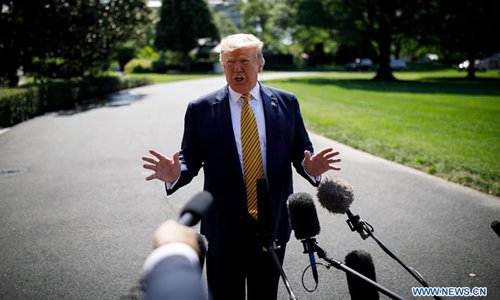Major Power Relations
Your Present Location: PROGRAMS> Major Power RelationsNew US sanctions on Iran to destabilize region

US President Donald Trump speaks to reporters before departing from the White House in Washington D.C., the United States, June 22, 2019. Donald Trump on Saturday said that the United States would impose major additional sanctions against Iran on Monday. Xinhua/Ting Shen
The latest US sanctions on Iran will only worsen safety and stability in the Middle East, so China should take active measures to ensure its economic interests and stability in this region, experts said.
US President Donald Trump said on Saturday that the US will impose major additional sanctions on Iran to prevent it from acquiring nuclear weapons and to "make Iran great again," CNN reported on Saturday.
"The sanctions imposed by the US will only provoke Iran and deteriorate the current situation amid the tensions between them. If there is a major conflict, it could greatly affect the Chinese economy and national interests in the Middle East," Wu Sike, China's former special envoy on Middle East affairs, told the Global Times on Sunday.
The Middle East is a very important region for the implementation of China's Belt and Road Initiative (BRI) as it geographically connects the East and West, and many Middle Eastern countries, including Iran, are BRI participants, Wu said.
According to The Economist magazine, about half of China's oil comes from Arab states and Iran. China pledged $23 billion in loans and aid to Arab states and signed another $28 billion dollars in investment and construction deals.
The announcement of new sanctions came shortly after President Trump on Friday called off retaliatory military strikes on Iran after Tehran downed a US military drone on Thursday.
The International Atomic Energy Agency has repeated 15 consecutive times that Iran had fulfilled its obligations in the Joint Comprehensive Plan of Action (JCPOA) which was signed in 2015.
However, the White House announced on April 21 that it would end oil purchase waivers by May 2 to Iran's five main customers, including China, cutting Iran's access to its main source of foreign currency revenue.
China's Foreign Ministry said Thursday that China hopes that all parties will respect the reasonable demands of the Iranian side and maintain the balance of rights and obligations under the JCPOA.
"China hopes that no country will seek to disrupt the situation in the Middle East. China will continue to strengthen its bilateral comprehensive strategic partnership with Iran and take active measures to maintain stability in this region," Cheng Tong, dean of School of Asian and African Studies, told the Global Times.
Wu Sike is a senior fellow of Chongyang Institute for Financial Studies at Renmin University of China.























































































 京公网安备 11010802037854号
京公网安备 11010802037854号





